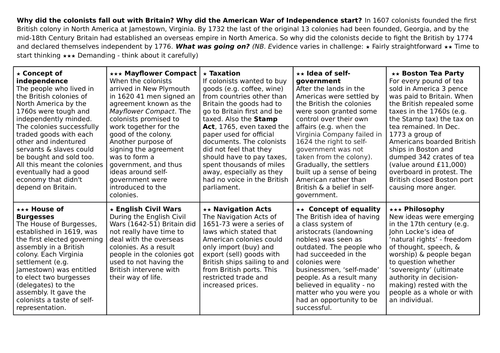

Boston Tea Party? Check. Navigation Acts? Yes. Stamp Act? Yup. House of Burgesses? Included. Enlightenment ideas? Tick.
All these causes and more are mentioned on a very accessible worksheet that covers multiple reasons behind the big questions: Why did the colonists fall out with Britain? Why did the American War of Independence start?
Information is very simply differentiated (one-star for ‘straightforward’ through to three-stars for ‘think about it carefully’) allowing students to quickly see the challenge offered by each piece of evidence and choose their starting point accordingly. There is space for a key but it's not completely finished as prefer to ask students to devise their own categories/groups to develop their analytical skills / ability to think independently. Nevertheless, provided one example category to get them started - 'contributing factor – had an effect but the war would still have started without it'.
Finally, I've put a couple of extra factors (the Boston Massacre & French and Indian War) on the back to stretch their knowledge a bit further too.
Suitable for many GCSE History specs:
- AQA GCSE History: Britain: Migration, empires and the people: c790 to the present day (an option in Section A of Paper 2 - Thematic studies).
- Edexcel GCSE History. Definitely relevant to issues within the ‘British America, 1713–83: empire and revolution’ unit (a period study option in Paper 2).
- OCR GCSE History A. Worksheet links to the section on the political and social impact of empire (within the Paper 3 British depth study - Impact of Empire on Britain 1688–c.1730) as difficult to discuss the emergence of consumerism and its wider political and economic impacts on Britain without mentioning the loss of the North American colonies and subsequent re-focus on India.
- OCR GCSE History B - Schools History Project. Worksheet links to the Early Modern Britain c.1500–c.1750 section within the Paper 1 thematic study - Migrants to Britain, c.1250 to present; difficult to do an overview of ‘the growth in world trade’ without mentioning the North American colonies. Worksheet would also be useful as part of an introduction to the Paper 3 period study - The Making of America, 1789–1900.
All these causes and more are mentioned on a very accessible worksheet that covers multiple reasons behind the big questions: Why did the colonists fall out with Britain? Why did the American War of Independence start?
Information is very simply differentiated (one-star for ‘straightforward’ through to three-stars for ‘think about it carefully’) allowing students to quickly see the challenge offered by each piece of evidence and choose their starting point accordingly. There is space for a key but it's not completely finished as prefer to ask students to devise their own categories/groups to develop their analytical skills / ability to think independently. Nevertheless, provided one example category to get them started - 'contributing factor – had an effect but the war would still have started without it'.
Finally, I've put a couple of extra factors (the Boston Massacre & French and Indian War) on the back to stretch their knowledge a bit further too.
Suitable for many GCSE History specs:
- AQA GCSE History: Britain: Migration, empires and the people: c790 to the present day (an option in Section A of Paper 2 - Thematic studies).
- Edexcel GCSE History. Definitely relevant to issues within the ‘British America, 1713–83: empire and revolution’ unit (a period study option in Paper 2).
- OCR GCSE History A. Worksheet links to the section on the political and social impact of empire (within the Paper 3 British depth study - Impact of Empire on Britain 1688–c.1730) as difficult to discuss the emergence of consumerism and its wider political and economic impacts on Britain without mentioning the loss of the North American colonies and subsequent re-focus on India.
- OCR GCSE History B - Schools History Project. Worksheet links to the Early Modern Britain c.1500–c.1750 section within the Paper 1 thematic study - Migrants to Britain, c.1250 to present; difficult to do an overview of ‘the growth in world trade’ without mentioning the North American colonies. Worksheet would also be useful as part of an introduction to the Paper 3 period study - The Making of America, 1789–1900.
Something went wrong, please try again later.
This resource hasn't been reviewed yet
To ensure quality for our reviews, only customers who have purchased this resource can review it
Report this resourceto let us know if it violates our terms and conditions.
Our customer service team will review your report and will be in touch.
£2.00